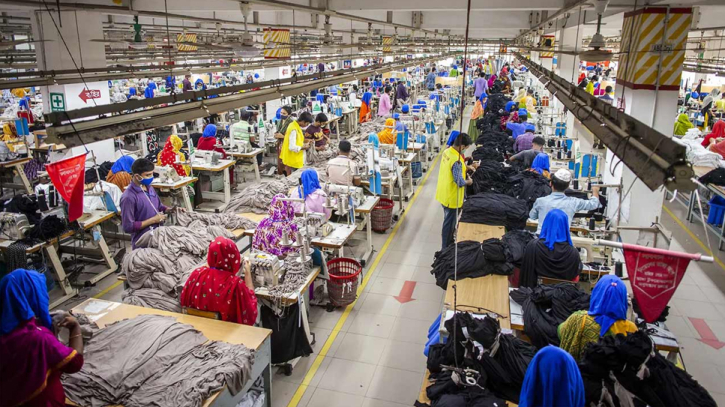
Photo : Collected
Apparel exports of the country continue to break records despite global economic instability. However, amidst this success, a significant portion of the sector's workers are still grappling with issues related to their salaries and festival bonuses.
Just a week before Eid, the country's largest festival, garment workers are taking to the streets in various regions, staging demonstrations to demand fair Eid bonuses and timely payment of their salaries.
Workers of Lithi Group's Apparels-21 Limited factory in Gazipur are observing a work abstention since Wednesday morning, demanding extension of Eid holidays and payment of bonus.
Thousands of workers staged protests inside the factory at Shishir Chala village in Bagher Bazar area of Joydevpur from 8:00 am on Wednesday, Inspector Ariful Islam of the Gazipur Industrial Police informed the press.
Employees of Keya Knit Composite Garment Factory in the Jarun area of Gazipur city have launched a strike demanding their overdue salaries and bonuses on Tuesday.
Mohammad Hatem Executive President of Bangladesh Knitwear Manufacturers and Exporters Association (BKMEA) told The Daily Messenger, "We have requested the authorities to release Tk 4,000 crore before Eid," adding that "there is a lot of trouble in various factories right now. It will be difficult for many factories to pay wages and allowances to their workers if the funds are not received before Eid."
Garments Sramik Front on Friday demanded the garment factory owners pay salary and festival bonuses to the workers soon ahead of Eid-ul Fitr. It also demanded payment of their arrears and stop job cuts and repression.
Recently, the trade union placed the demands, staging a demonstration in front of the National Press Club in the capital.
Leaders of the Garments Sramik Front, including its President Ahsan Habib Bulbul and General Secretary Selim Mahmud, spoke on the occasion.
Workers leader Babul Akter told the Daily Mesenger “Some small factories cannot pay the salaries and bonus but still there is time to pay before Eid. All the big factories have paid the arrears and bonus.”
Despite the fortunate surge in apparel exports, boasting an impressive 84 percent increase and securing the second position globally in exporting ready-to-wear garments, it's crucial not to overlook the plight of the sector's backbone—the workers.
Over the past four decades, Bangladesh has diligently built a robust infrastructure, leveraging its abundant pool of affordable labor. This strategic investment has propelled the country's garment sector to handle an impressive $5 billion in foreign currency monthly, largely thanks to the dedicated workforce.
However, the sector's competitiveness hinges on the availability of this cheap labor. If workers were to refuse to work at these rates, the sector's ability to remain competitive would be severely compromised, especially considering China's phased withdrawal from the garment industry due to high labor costs.
Recognising the importance of fair wages, the government established a wage board on April 9 last year to recommend a new wage structure for the over 4 million garment workers in Bangladesh. Despite labor rights organisations advocating for a minimum wage of up to Tk 25,000, the board has only allowed Tk 12,500, which unfortunately falls short of meeting the workers' basic needs and cannot be paid consistently and on time.
Nevertheless, over the past 15 years, garment factories have made significant strides in automation, attracting more buyers and enhancing the "Made in Bangladesh" brand's reputation for impeccable finishing, attributed to the exceptional skills of the workforce.
Messenger/Fameema








